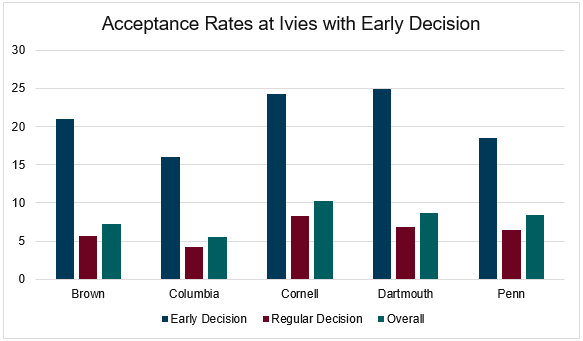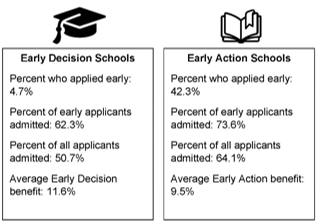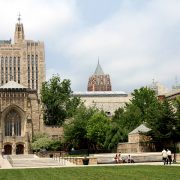Let’s take a deep dive into one of the most common college admissions questions out there: Should you apply to college early?
Early Application Programs: What’s the Difference Between Early Action and Early Decision?
Colleges offer a few different early application options, so do your research. Before you click submit, make sure you know exactly what you’re agreeing to!
Early Decision Applications
By applying through Early Decision, you’re giving the college a promise ring: If only you’ll take me, I’m yours! If you are admitted through Early Decision, you are obligated to attend the school (barring extreme financial hardship or other extenuating circumstances).
The good news? Early decision applicants usually have a significant leg up in admission rates. Check out these numbers:

Proportionally, way more students get in through Early Decision than through Regular Decision. This doesn’t mean that it’s easier to get in through Early Decision—the pool of applicants tends to be stronger overall—but the added demonstrated interest of applying through a binding Early Decision program certainly helps.
Early Action Applications
Early action programs are pretty flexible. You get to apply early, you get to find out the answer sooner, and you’re not committing to anything. The downside is that Early Action doesn’t usually confer the same admission benefits as Early Decision.

While only a small percentage of applicants make the commitment required by Early Decision programs, nearly half of all applicants at schools with Early Action apply early. Applying through Early Action just doesn’t show the same level of interest in the school as Early Decision does. This helps to explain why Early Decision tends to give a greater admissions bump than Early Action.
Single-Choice Early Action
And then there is the relative newcomer to the early application party: Single-Choice Early Action. Schools like Harvard and Princeton employ Single-Choice Early Action programs to get the best of both worlds.
Students who apply through these programs are not obligated to enroll if they are admitted, but they are not allowed to apply early to other private colleges. A student who applies through Single-Choice Early Action is showing demonstrated interest by forgoing the possible benefits of early applications at similar colleges, but the student still has options open after admission decisions arrive.
Does Applying Early Boost Chances of Admission?
The short answer: usually.
At some colleges, there is a significant difference in the admission rates between early application programs and regular applications programs. At other colleges, there is virtually no difference. And at very tiny handful of colleges, admission rates may actually be higher through regular admission than through early application programs.
In other words, it’s worth doing your research.
That said, there can be some benefit to applying early at particularly competitive colleges. At highly competitive schools, sometimes it is the smallest details that can make the difference between admission and rejection. By applying early, you send the message that you are incredibly interested in attending that school; this may make a very slight difference in admission decisions. Moreover, if you are deferred into the regular admission pool, your early interest may further emphasize your interest in the school, thereby slightly helping your chances of admission.

Should You Apply to College Early?
Maybe.
Early admission programs are popular for good reason: Nothing feels better than starting winter break with a few admission offers in hand. You can eliminate a lot of stress and potentially boost your chances of admission by applying early.
But there are some cases in which you should NOT take advantage of early admission programs:
- You won’t be able to finalize your test scores before the early application deadline
- Your GPA would benefit from one more semester of strong grades before submitting applications
- You feel like you’d have to really rush your essays to meet the deadlines
- You’re considering applying Early Decision to a school you’re not 100% absolutely, positively sure you want to attend
In the first three scenarios, you’ll be a stronger applicant if you wait. Better test scores, a higher GPA, or a much stronger essay will ultimately make a bigger difference to your chances for admission than meeting an earlier deadline will.
The final scenario is worth highlighting: Never apply Early Decision at a school you aren’t sure you want to attend. If you get in, that’s it—you have to enroll. The decision is out of your hands. (What’s that you say? You fell in love with a different school? Gee, that’s tough. Maybe you can transfer there later…)









